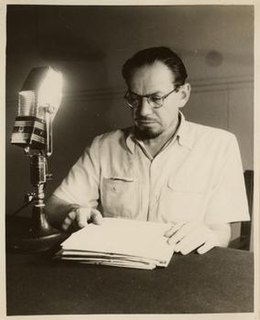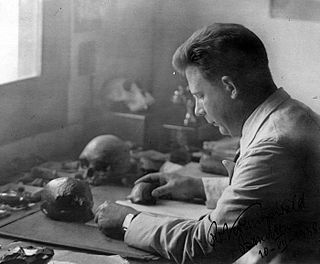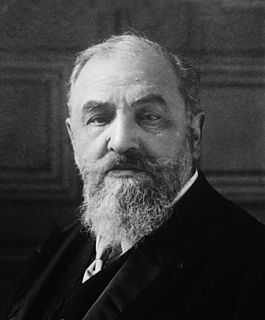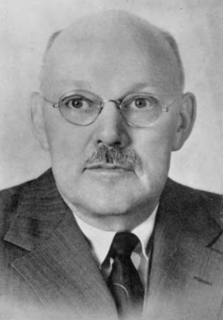A Quote by Muhammad Asad
The religious urge in man is not a mere passing phase in the history of his spiritual development, but the ultimate source of all his ethical thought and all his concepts of morality; not the outcome of primitive credulity which a more "enlightened" age could outgrow, but the only answer to a real, basic need of man at all times and in all environments. In another word, it is an instinct.
Quote Topics
Related Quotes
Man did not address his inquiries to the earth on which he stood until a remarkably late stage in the development of his desire for knowledge. And the answers he received to the questions, "Where do I come from?", "What is man?", although they made him poorer by a few illusions, gave him in compensation a knowledge of his past that is vaster than he could ever have dreamed. For it emerged that the history of life was his history too.
Where man had been, in every place he left, garbage remained. Even in his pursuit of the ultimate truth and quest for his God, he produced garbage. By his garbage, which lay stratum upon stratum, he could always - one had only to dig - be known. For more long-lived than man is his refuse. Garbage alone lives after him.
Solitude is the profoundest fact of the human condition. Man is the only being who knows he is alone, and the only one who seeks out another. His nature - if that word can be used in reference to man, who has ‘invented’ himself by saying ‘no’ to nature - consists in his longing to realize himself in another. Man is nostalgia and a search for communion. Therefore, when he is aware of himself he is aware of his lack of another, that is, of his solitude.
To assert that it is possible to establish peace between men of different nations is simply to assert that man, whatever his ethnical background, his race, religious beliefs, or philosophy, is capable of reason. Two forces within the individual contribute to the development of his conscience and of his morality: reason and sensitivity.
Throughout the history of commercial life nobody has ever quite liked the commission man. His function is too vague, his presence always seems one too many, his profit looks too easy, and even when you admit that he has a necessary function, you feel that this function is, as it were, a personification of something that in an ethical society would not need to exist. If people could deal with one another honestly, they would not need agents.
Man is more than his environment. It is from the innate quality of the Spirit in him, his inner storehouse, that he draws those ideas, his intuitions, which unify his perceptions of the external world instantaneously with a value which is qualitative and not quantitative, and which he embodies in the works of his culture - those achievements which belong not only to one particular time but to all times, and mark the path of his upward progress.
So long as men desire to live together, no man may initiate the use of physical force against others. . . . When a man attempts to deal with me by force, I answer him by force. It is only as retaliation that force may be used and only against the man who starts its use. No, I do not share his evil or sink to his concept of morality: I merely grant him his choice, destruction, the only destruction he had the right to choose: his own.
When a man’s heart is cold and unconcerned about religion – when his hands are never employed in doing God’s work – when his feet are not familiar with God’s ways – when his tongue is seldom or never used in prayer and praise – when his eyes are blind to the beauty of the kingdom of heaven – when his mind is full of the world, and has no room for spiritual things – when these marks are to be found in a man the word of the Bible is the right word to use about him, and that word is, ‘Dead.’
The mortal enemies of man are not his fellows of another continent or race; they are the aspects of the physical world which limit or challenge his control, the disease germs that attack him and his domesticated plants and animals, and the insects that carry many of these germs as well as working notable direct injury. This is not the age of man, however great his superiority in size and intelligence; it is literally the age of insects.
Man cannot survive except through his mind. He comes on earth unarmed. His brain is his only weapon. Animals obtain food by force. man had no claws, no fangs, no horns, no great strength of muscle. He must plant his food or hunt it. To plant, he needs a process of thought. To hunt, he needs weapons,and to make weapons - a process of thought. From this simplest necessity to the highest religious abstraction, from the wheel to the skyscraper, everything we are and we have comes from a single attribute of man -the function of his reasoning mind.
Step back in time; look closely at the child in the very arms of his mother; see the external world reflected for the first time in the yet unclear mirror of his understanding; study the first examples which strike his eyes; listen to the first words which arouse within him the slumbering power of thought; watch the first struggles which he has to undergo; only then will you comprehend the source of his prejudices, the habits, and the passions which are to rule his life. The entire man, so to speak, comes fully formed in the wrappings of his cradle.































